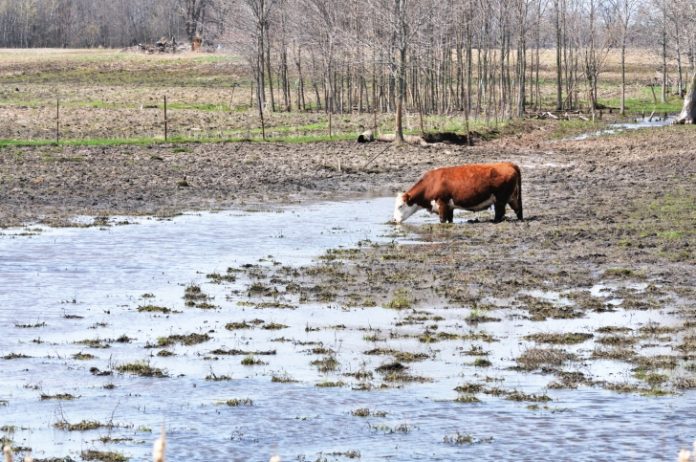The U.S. Ninth Circuit Court of Appeals rejected a challenge to the application of wetlands permitting requirements imposed under the 1972 Clean Water Act (CWA) on property near Priest Lake, Idaho, owned by Mike and Chantell Sackett.
Wetlands or Not?
The Sacketts have been trying for more than a decade to build a home on a little over a half-acre of land they purchased in Priest Lake, Idaho in 2005.
In April and May of 2007, the Sacketts filled in two-thirds of their property with dirt and rock in preparation for building a house. On November 26, 2007, the U.S. Environmental Protection Agency (EPA) issued a compliance order against the Sacketts, requiring them to remove the fill material and restore the parcel to its original condition. The EPA alleged their property was a wetland, requiring a permit to fill.
The Sacketts fought to overturn EPA’s order, initially within the agency and then in court.
Initially, the Sacketts sought a hearing with EPA to dispute the property was a wetland requiring a permit and meriting a compliance order. The EPA refused to grant such a hearing. At this point the Sacketts sued in federal court to overturn the compliance order.
Multiple federal courts denied the Sacketts the right to challenge EPA’s compliance order, ruling that until the agency moved to enforce its order, they had no legal recourse.
In 2011 the Supreme Court disagreed. In a ruling authored by the late Justice Antonin Scalia, a unanimous court held that under the 1946 Administrative Procedure Act, the Sacketts had the legal right to challenge the EPA’s jurisdictional determination without first being threatened with penalties.
EPA Drops Order, Court Keeps Case
After losing on the issue of jurisdiction EPA proceeded to defend in District court its view that the Sacketts property did, in fact, consist of federally regulated wetlands.
The district court sided with EPA and the Sacketts appealed. During the appeal the EPA reversed itself, concluding the Sacketts activities did not require a permit. On March 2020, the EPA withdrew its compliance order.
The case should have been over, but rather than allowing EPA to withdraw from the case, the Ninth Circuit Court determined the case should proceed.
In an August 16 ruling the court found a “significant nexus” exists between the Sacketts property and wetlands and streams falling under the CWA’s jurisdiction, and thus they needed a permit from EPA to develop their property.
The August 16 ruling was predicated on former Supreme Court Justice Anthony Kennedy’s concurrence with the majority opinion in a 2006 case, Rapanos v United States.
‘Significant Nexus’ Standard
Judge Michelle Friedland, writing for the three-judge panel of the Ninth Circuit Court of Appeals, noted the Sacketts property was located 300 feet from Priest Lake, a traditionally navigable water, thereby satisfying Kennedy “significant nexus” test.
“It is clear that the requirements of the Kennedy concurrence and the applicable regulations are satisfied here,” Friedland wrote. “The record plainly supports EPA’s conclusion that the wetlands on the Sacketts’ property are adjacent to a jurisdictional tributary and that, together with the similarly situated Kalispell Bay Fen, they have a significant nexus to Priest Lake, a traditional navigable water.”
In an e-mail sent to the press, Tony Francois, an attorney with the Pacific Legal Foundation, which represented the Sacketts throughout the process, said he believed the court had ruled incorrectly.
“We are reviewing the decision and conferring with the Sacketts, but we think that this decision is erroneous and will be assessing the best course forward to free the Sacketts’ property from EPA’s illegal assertion of Clean Water Act authority over it,” Francois’s e-mail said.
If the Sacketts do appeal, they are likely to rely on Scalia’s narrower definition of the federal government’s CWA jurisdiction, in the plurality opinion he authored on behalf of the majority in Rampanos. In an opinion joined by Chief Justice John Roberts, Justice Clarence Thomas, and Justice Samuel Alito. Scalia wrote the federal government’s jurisdiction over wetlands should only extend to wetlands that “actually abut on” traditional navigable waters, exhibiting a relatively permanent flow, such as a river, lake, or stream.
EPA Overreach
Throughout their legal odyssey the Sacketts were supported by amicus briefs from the American Farm Bureau Federation, the Center for Constitutional Jurisprudence, and the National Association of Homebuilders.
The definition of “navigable waters” employed by the EPA and the Ninth Circuit represents a dangerous overreach, says Craig Rucker, president of the Committee For A Constructive Tomorrow, which co-publishes Environment & Climate News.
“The 9th Circuit’s decision to broadly interpret ‘navigable waters’ is tragic news for private property owners,” said Rucker. “By including ephemeral creeks, marshes, and ponds not directly connected to any large waterways, but only deemed by EPA bureaucrats to have some sort of purported ‘critical nexus,’ it makes it pretty easy for regulators to stomp on landowners and prohibit them from making any improvements on their property.
“The court erred by relying on Justice Kennedy’s broader definition of navigable waters, because Kennedy was the lone voice in the majority opinion in Rapanos in opting to include waters that weren’t directly adjacent to a tributary or lake in question,” Rucker said. “The others forming the majority – namely Justice Scalia, Justices Thomas, Alito, and Roberts – agreed that Congress’ original intent was to have a more limited definition, and it’s surprising to see the Ninth Circuit spurn their point of view entirely.”
Kevin Stone (kevin.s.stone@gmail.com) writes from Arlington, Texas.


























